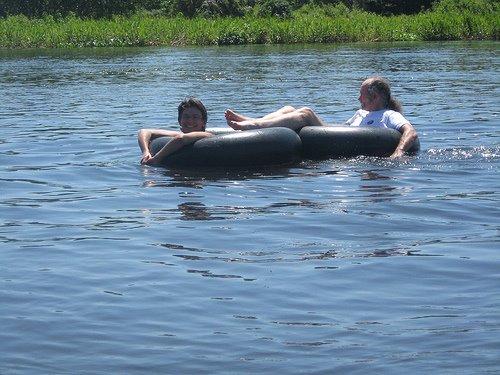We took an overnight bus from Cochabamba to Santa Cruz. We went down, down, down, and then the land became flat. We drove past wide and shallow rivers streaked with sand bars, and palm trees, banana trees, cattle pastures and crops I can~t identify. We rode in our "bus cama" (bus with reclining seats) past poorer Bolivians riding in the open backs of freight trucks. During the ride, I had time to reflect a bit on Bolivia.
Some of the things that we take for granted in the U.S. can be a major ordeal in Bolivia. Gas fuel, for instance. Our house, like many, is not hooked to the gas line in Cochabamba, so we have a small yellow gas tank that we connect to our kitchen stove and use for cooking fuel. (The kitchen stove is the only appliance that uses gas here, as we have no heating stove or furnace, and no hot water other than in our electric sho9wer, which is heated using an on demand electric water heater). When the tank runs empty, the flame in the kitchen stove dies and we must immediately trade our tank for a full one. This was no problem when gas was available at our corner grocery store, but lately for some reason the stores don~t carry gas and we can only get it from the gas truck that drives around every few days. We have to listen for the sound of the gas truck, which sounds like a guy hitting a gas tank with a metal object, and go running out to the street with our empty tank. Meanwhile, we could be out of gas for several days which means no cooking and no purifing our water by boiling. Fortunately, our landlord has now purchased a second gas tank so that we always have a spare on hand, but most Bolivians can´t afford to do this.
Speaking of things that most Bolivians cannot afford, I recently learned that it costs US $900 to buy a telephone line in Cochabamba. This just gets you the phone number, nothing more. When most Cochabambinos earn less than US $100 per month, this is prohibitively expensive. Cell phones, bad for the environment as they are, are a cheaper option.
Many transactions in Bolivia, especially those for larger amounts, are done in U.S. dollars. Rent is paid in dollars. Houses and cars are purchased and college tuition is paid, all in dollars. Many people, especially those with a higher salary, are paid in dollars. At the supermarket, where richer people shop, the cash register provides the total in both dollars and Bolivianos. When I use my ATM card to make a withdrawal from my checking account, I can choose to withdraw dollars or Bolivianos. People with better jobs are often paid in dollars. I dont know the reason for this, except that it´s much more practical to pay large sums in dollars, as the largest Boliviano bill is 200 Bs, or about US $27. You would need a huge wad of Bolivianos to buy a used car, for example.
Gary does most of our shopping at the local markets, rather than at the supermarkets. Nearly all the food here is fresh: freshe fruit, fresh vegetables and fresh grains. There is little prepared food here. Bolivians don´t seem to buy canned soups or other prepared foods, and the result is that we eat a lot of delicious, fresh foods. Unlike in the U.S., fresh food costs much less than the few processed or prepared items that are available here. This is the way it should be!
Monday, March 31, 2008
Subscribe to:
Post Comments (Atom)

No comments:
Post a Comment